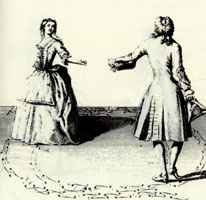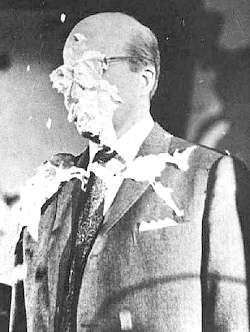Yet another long-running organization with plans for world domination. Be interesting to see how they fit together the Supreme Council of Global Jihad that al-Hawali seems to be running for Binny. Given our luck, we're probably still only like half-way up the ladder till we finally reach the Eddorians.
When mild-mannered former Iranian president Mohammad Khatami lashed out in a post-election sermon at the "powerful organization" behind the "shallow-thinking traditionalists with their Stone-Age backwardness" currently running the country, it became clear that Iran's political establishment is worried by the ideology propelling the government of new hardline President Mahmud Ahmadinejad.
Khatami's attack coincides with mounting evidence that a radically anti-Bahai [1] and anti-Sunni semi-clandestine society, called the Hojjatieh, is reemerging in the corridors of power in Tehran. The group flourished during the 1979 revolution that ousted the Shah and installed an Islamic government in his place, and was banned in 1983 by Ayatollah Ruhollah Khomeini, the father of the revolution.
Khomeini objected to the Hojjatieh's rejection of his doctrine of velayat-e faqih (Guardianship of the Jurist) and its conviction that chaos must be created to hasten the coming of the Mahdi, the 12th Shi'ite imam. Only then, they argue, can a genuine Islamic republic be established.
"Those who regarded the revolution, during Imam Khomeini's time, as a deviation, are now [wielding] the tools of terror and oppression," Khatami was reported as saying at a speech in the conservative northeastern town of Mashhad, the same location chosen by Ahmadinejad to convene the first meeting of his cabinet.
"The shallow-thinking traditionalists with their Stone-Age backwardness now have a powerful organization behind them," he said, in what was interpreted as an indirect reference to the Hojjatieh society.
Khatami's sharp comments followed an outburst by Ahmad Tavassoli, a former chief of staff of Khomeini. Tavassoli claimed that the executive branch of the Iranian government as well as the crack troops of the Revolutionary Guards had been hijacked by the Hojjatieh, which, he implied, now also controls Ahmadinejad.
Amid talk that the recent election was a silent coup carried out by elements of the hardline Revolutionary Guard after eight years of reformist rule, Western embassies have been scrambling to understand what the Hojjatieh stands for and to what extent the influence of its teachings will be felt in the new government's domestic and foreign policies.
Asia Times Online spoke last week with European and North American diplomats in Tehran who are trying to identify which of the new government's ministers have sympathies with the Hojjatieh or a part in the organization.
After its banning in the 1980s, the Hojjatieh's members faded into the ranks of the bazaar-based Islamic Coalition Society (Mo'talife). Reports in the past few years that the society is reviving have stressed that the neo-Hojjatieh are not so much anti-Bahai as "fanning the flames of discord between Shi'ites and Sunnis", according to the August 28, 2002 edition of the Hamshahri daily.
Ahmadinejad himself is said to have sympathies with the Hojjatieh, if he was not a member outright at some point in his career. The Islamic society he belonged to at Alm-u Sanat University where he attended was an extreme traditional and fundamentalist group that contained a large number of students from the provinces and maintained grass-roots links with the Hojjatieh. The society's anti-leftism also chimes with reports that Ahmadinejad was pushing for a takeover of the Soviet Embassy alongside or instead of the US compound in Tehran during the 1979 revolution.
Of the 21 new ministers in Ahmadinejad's cabinet, three are said to have Hojjatieh backgrounds, including Intelligence chief Hojatoleslam Gholam Hossein Mohseni-Ejehyi, a graduate of the Hojjatieh-founded Haqqani theological school with a long background in the intelligence services. Ayatollah Mohammad Taqi Mesbah-Yazdi, a hardline Shi'ite cleric who is said to have issued a fatwa urging all 2 million members of the bassij Islamic militia [2] to vote for Ahmadinejad in the recent presidential elections, is also associated with that university.
The hardline minister of the interior, Mostafa Pourmohammadi, is another Haqqani alumnus with suspected Hojjatieh sympathies. His appointment was greeted with outrage by some Iranian politicians. Tehran member of parliament Emad Afruq was reported by Islamic Republic News Agency on August 24 to have challenged Pourmohammadi's appointment on the basis of his questionable human rights record while at the Ministry of Intelligence: "You must recognize that when someone comes from such a ministry, with this past and the absence of supervisory mechanisms, our reaction is that we shudder with fear in the public arena. And have we not shuddered? Have we not felt insecure in the past?"
A few days after the new cabinet was revealed, a dinner party in North Tehran's exclusive Elahiyeh neighborhood was buzzing with talk of Hojjatieh involvement in the new government. One Iranian working as a political analyst for a Western embassy fingered the controversial Ayatollah Mesbah-Yazdi as the main reason behind the transformation of an initially anarchist movement that rejected any form of government, especially an Islamic one, into a key actor influencing the policies of the Ahmadinejad administration.
The powerful cleric is said to be Ahmadinejad's marja-e taqlid (object of emulation) and the ultimate proponent of an elite theory of government best summed up in his once saying: "It doesn't matter what the people think. The people are ignorant sheep."
"There is no doubt that Mesbah and the new crew, whether formally Hojjatieh or not, are more attached to core Shi'ite identity and values," said Vali Nast, a professor of Middle East politics at the Department of National Security Affairs. "But an equally important faction, especially in the Islamic Revolutionary Guards Council, is simply anti-Ba'athist. These are people who fought in the Iran-Iraq war and that may also be important in deciding attitudes towards Saudi Arabia and Iraq."
At a time of rising Sunni-Shi'ite tensions in the region, and as Iraq increasingly turns into a proxy battleground for its neighbors, it is not surprising that a Shi'ite supremacist government in Tehran, whether related to the Hojjatieh or not, should reemerge.
Saudi Arabia and Iran are battling it out in Iraq as both seek to win the hearts and minds of ordinary Iraqis, the majority of whom are Shi'ites. While Iran is believed to have a better intelligence presence in the country and a more organized military capability, Saudis account for a large percentage of the suicide bombers active there.
In an August Newsweek article, former Central Intelligence Agency agent Robert Baer quoted a high-level Syrian official telling him that of 1,200 suspected suicide bombers arrested by the Syrians since Iraq was invaded in 2003, 85% have been Saudis. Baer went on to quote Iran's Grand Ayatollah Saanei reacting to the news by describing Wahhabi suicide bombers as "wolves without pity" and saying that "sooner rather than later, Iran will have to put them down".
Saudi Arabia is also reported to be active in Iran, especially in the ethnically Arab, oil-rich south of the country, where it is whispered that Riyadh is offering financial incentives for locals to convert from Shi'ite to Sunni Islam. News of this strategy has reached Qom, the clerical heartland of Iran.
In an April 2004 article, Persian-language Baztab news website that is written by well-connected insiders and read by Iran's political elite, published a piece alleging that the Hojjatieh had adopted a strategy of trying to sharpen domestic tensions between Sunnis and Shi'ites through launching a propaganda campaign against the minority religious group inside Iran (Sunnis). The report alleged that some Hojjatieh-aligned publishers have been issuing books in Arabic that are critical of Sunnis. The books have been distributed in Qom, but are fictitiously marked "Published in Beirut" to give them further credibility and mask the fact they are Shi'ite propaganda.
This is a potentially dangerous move with grave foreign policy implications for Iran. Iran's Sunni minorities live in some of the least-developed provinces and are under-represented in parliament, the army and the civil service. Iran's Kurds, who are Sunni, have been rioting in the north, while the ethnic Arab south is another location that has suffered riots and a bombing campaign in the past six months.
But whether the Hojjatieh is being resurrected by its former adherents or is being used as a battering ram by those Iranian politicians opposed to the current government, its reappearance coincides with a Shi'ite resurgence across the region and a new era of conservative factional infighting in Tehran.
"This particular form of mud-slinging that had disappeared a quarter of a century ago - when the secular left accused the religious establishment of having clandestine Hojjatieh affiliations - is gaining currency again in the new battle of Titans: the traditional right-wing versus the revolutionary right-wing clerical establishment - over ideological hegemony in Iran," concluded Mahmoud Sadri, a US-based Iranian academic. |
 Tehran, Iran, Feb. 21 A senior Iranian cleric has retained his post as head of a key constitutional supervisory body, amid speculation that he would forego the position to Irans former President Ayatollah Ali Akbar Hashemi Rafsanjani.
Tehran, Iran, Feb. 21 A senior Iranian cleric has retained his post as head of a key constitutional supervisory body, amid speculation that he would forego the position to Irans former President Ayatollah Ali Akbar Hashemi Rafsanjani.
 (Xinhua) -- Iran's Interior Ministry on Thursday released the final result of the third local council election held last Friday, showing a brand-new political dimension since President Mahmoud Ahmadinejad took office in 2005. According to published figures,
(Xinhua) -- Iran's Interior Ministry on Thursday released the final result of the third local council election held last Friday, showing a brand-new political dimension since President Mahmoud Ahmadinejad took office in 2005. According to published figures,